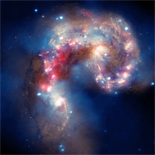Syllabus
ASTRONOMY 307
|
Section/Semester: |
Unique No. 47690, Fall 2010 |
|
Class Meetings: |
Tues & Thurs 9:30-10:45 AM, RLM 5.104* (*Take the stairs or escalator from the 4th=Ground floor) |
|
Instructor: |
Prof. Harriet Dinerstein, RLM 16.324 |
|
Contact Info: |
(512) 471-3449, harriet@astro.as.utexas.edu |
|
Office Hours: |
TBA |
|
Teaching Assistant: |
Caprice Phillips, RLM 15.310E |
|
Contact Info: |
(512) 471-3387, clphillips@astro.as.utexas.edu |
|
Office Hours: |
|
|
Help Sessions: |
RLM 13.132, W 5-6 PM, before exams & HW due dates |
Main Course Website:
https://www.as.utexas.edu/astronomy/education/fall10/dinerstein/307.html

Crab nebula (NASA/Spitzer)
Printable syllabus (pdf)
COURSE DESCRIPTION: Astronomy 307 is a one-semester introductory survey of modern astronomy designed for science and engineering majors. If you are enrolled in this course, we will assume that you enjoy solving problems using high-school level (non-calculus) math. If you don’t feel that you are this sort of person, please consider switching to one of the 6 sections of Astronomy 301, the introductory course intended for non-science majors, being offered this semester.
Astronomy is a very big subject to cover in one short semester, so we will move through the material fairly rapidly. My goal is to provide a comprehensive though brief overview of the Universe, from our Solar System to the largest scales. If we are not able to cover your favorite topic in sufficient depth to fully satisfy your curiosity, you may wish to take one of the Astronomy Department’s follow-up courses in a future semester. In particular, the Ast 309 courses cover a variety of special topics, from The Solar System to Galaxies, Quasars, & the Universe. We also offer advanced upper-division courses on Stellar Astronomy, Galaxies, Cosmology, etc., but most of these have prerequisites (usually two semesters of physics).
TEXTBOOK: We will use the 9th edition of the textbook “Universe” for which the lead author is Roger Freedman. (William Kaufmann was the original author, several editions and a couple of decades ago). It is available as a trade paperback, and you can probably get a used copy from the Co-op or on line. Used copies are likely to be about 65% the price of a new book. Alternatively, you can purchase an e-book for about the same price as a book, at http://www.whfreeman.com/. You can probably get away with buying the 8th edition, which is similar except for some “premium” content for which you would have to pay extra, anyway. You could also buy the 8th edition as a used book. There is also an auxiliary publisher’s website which offers some helpful study materials: http://bcs.whfreeman.com/universe9e/default.asp.
Caution: Don’t purchase a book or eBook entitled “Universe: The Solar System” or “Universe: Stars and Galaxies.” These versions omit major sections of the course material. Also, do not buy “Discovering the Universe” or “Discovering the Essential Universe,” by Neil Comins (& possibly William Kaufmann); this is a different book entirely. (If in doubt, feel free to email the instructor, before wasting precious funds!)
SCHEDULE OF TOPICS:
|
Unit I: Observing the Sky |
|
|
|
Unit II: Light, Scopes, and Planets |
|
|
|
Unit III: The Sun and Stars |
|
|
|
Unit IV: Galaxies and the Universe |
|
|
IMPORTANT DATES FOR SPRING 2010 CLASSES:
|
First class day: Wed., Aug. 25 |
|
4th Class Day (Last day of the official add/drop period): Mon., Aug. 30 |
|
12th Class Day (Last day to drop with a possible refund): Fri., Sep. 10 |
|
Last day to drop a class without a possible academic penalty: Wed. Sep. 22 |
|
Last day to drop, except for documented non-academic reasons; also last day to change between letter-grade and pass/fail grading: Wed., Oct. 20 |
COURSE REQUIREMENTS AND GRADING POLICIES: My general philosophy regarding earning credit and determining your course grade is as follows:

Antennae galaxies (NASA/Spitzer)
- Grades should be based on your individual performance, not on a “curve” driven by other students. There will be no quotas on A's or B’s.
- A significant portion of the grade will be based on sustained effort throughout the semester, such as regularly assigned homework, and participation credits earned either in class or in certain pre-approved external activities.
- The exams will incorporate several different formats, including multiple-choice questions, short essays, and numerical problems. There will usually be some choice among the questions presented for the latter two categories.
- No individual make-up exams will be given for missed hour exams, nor are any excuses or documents required. Instead, I offer all students the opportunity to take an optional comprehensive final exam during finals week. For our class meeting time, the final is Mon., Dec. 13, 2 – 5 PM. Because the final exam covers the entire semester, it will serve as the all-purpose make-up exam for any one of the earlier missed exams. In addition, anyone who would like to improve their overall course performance and grade is welcome to take the optional final, even if they did not miss an earlier exam. The best three exam scores of all four (3 in-class exams plus the final) count towards your course grade.
GRADE ACCESS AND BASIS: You will be able to access your grades on specific assignments on graded papers or via eGradebook, which will be updated frequently. (eGradebook is similar to Blackboard, but is maintained by U.T., although it will be eliminated in Spring 2011.) The breakdown for the course grade will be as follows:
Hour Exams: 72%. There will be three in-class exams, each worth 24% of your grade. These will last less than a full class period (50 instead of 75 minutes). The format will be mixed: a combination of multiple choice, short essays, and numerical problems. Bring your calculator; we will provide paper and a list of constants and equations. Note: Since our classroom is rather cramped, the exams may be held in another location; watch the Announcements for information!
Exam Dates: Sep. 30, Nov. 4, and Dec. 2
Graded Homeworks: 16%. There will be 7 or 8 graded problem sets during the semester. The lowest score will be dropped from the homework total. You will usually have a week to complete each HW, with several opportunities to obtain help from the T.A. or instructor (see below). While you may discuss how to approach the homework with classmates, and seek help if you need it, the work you turn in must be your own.
Lateness Policy for Homework: You are expected to turn in homework on time, which means at the beginning of class on the due date. If it is turned in within the next 24 hours, it will receive reduced credit. (Details of where to turn it in will be announced). Homeworks that are more than 24 hours late will not be accepted for credit.
Participation Credits: 12%. The remaining 12% of the grade will be based on various activities, mostly in class but also some out-of-class events. The in-class activities may include pop quizzes, index cards, and surveys. External activities can include Star Parties and special lectures; no more than 4 points can be earned from such activities. This credit is cumulative and there will be more than 12 credits available to be earned, although once you reach the maximum of 12 points, you’ll be “maxed out.” Advice to the student: this portion of your grade is under your control; it’s up to you to earn it!
INSTRUCTOR POLICIES AND EXPECTATIONS: This course is designed under the assumption that students will attend regularly and will stay up to date on the material and assignments. Do “bookmark” the website and consult it frequently for information, assignments, and feedback. It should always be the first place to look for answers for your questions, before contacting the T.A. or instructor.
Classroom Protocol: While in class, I expect everyone to be respectful of the instructor and classmates. The classroom is not the place for social interactions or cell phone conversations. Please turn off the volume on your cell phone before the beginning of class. First time violators will be merely grimaced at, but subsequent cell-phone disruptions will adversely affect your grade. In addition, although some instructors allow students to use laptops in class, I find it distracting, and our classroom is crowded. Therefore I will not allow open laptops in regular class sessions.

Coronet cluster (NASA/Spitzer)
Scholastic Integrity/Academic Dishonesty: The University of Texas at Austin's honor code is summarized at http://deanofstudents.utexas.edu/sjs/spot_honorcode.php. More details are given at http://deanofstudents.utexas.edu/sjs/index.php; see the links to "The Standard of Academic Integrity" and "Academic Dishonesty." The College of Natural Sciences takes these rules seriously. We will not tolerate copying or cheating on exams, homework, or other class work. If we find duplicated work or other evidence of cheating, neither student involved will receive credit. We may also impose more severe academic penalties, depending on the circumstances, not excluding an F for the course, or a report of academic dishonesty to the Dean of Students.
GETTING HELP: The Instructor and T.A. will hold office hours each week. Please try to make use of these designated times, if at all possible, since both of us have other responsibilities and will not necessarily be available at other times. However, if you cannot attend the announced office hours, please contact us to set up an alternate appointment time. Also, the T.A. will hold help sessions before each homework is due and before each exam. You can also send questions by email, but please check the class website first, to see whether the answer is already posted there.
STUDENTS WITH DISABILITIES: Upon request, the University of Texas at Austin provides appropriate academic adjustments for qualified students with disabilities. Contact the Office of the Dean of Students at 471-6259, or (TTY) 471-4641, or via email to ssd@uts.cc.utexas.edu or see http://deanofstudents.utexas.edu/ssd/
SPECIAL EVENTS: The Astronomy Department offers evening Star Parties on campus on most Wednesdays, Fridays, and Saturdays; details will be announced and posted at http://outreach.as.utexas.edu/public/viewing.html. You will be allowed to earn up to two participation credits by attending star parties (one credit per event). In order to earn credit, however, you must get a signed slip from the person in charge of the star party. Warning to the naïve: Star parties are held only when the weather permits. They are cancelled when it's too cloudy to see anything, so don't assume that you can wait until the end of the semester. If it's cloudy then, you will be out of luck!
There may be one or more public talks relevant to Ast 307 during this semester, which you may attend for participation credit. When such opportunities arise, they will be announced in class and through the course website. In order to earn participation credit for attending a public talk, you will need to submit a brief write-up summarizing in your own words what you heard and learned, ideally relating it to material learned in Ast 307. The write-up must be submitted to the instructor as hard copy (not emailed).